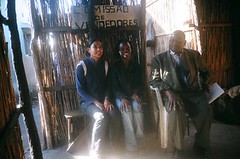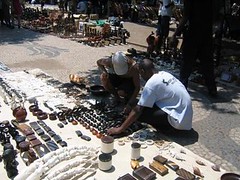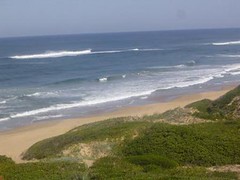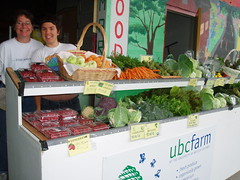"Small Things Count": a resource to those who approach their existence as a contribution to the world and how they live to making these initiatives happen in small or big ways.
Thursday, July 28, 2005
Make Trade Fair
Let's be honest. The fact is: developing countries are in debt and remain in impoverish situations partly because of unfair rates of interest on loans and strict conditions on trade. I see where part of where it comes from: high interest rates for those who are high risk of default. It is a large cost to monitor and maintain continuous payment by those with loans particularly thoe clients who choose to neglect the payment plan and go into arrears (do not pay on time) for months on end. This was part of the case with microfinance where the financial officers who had to look for those not paying their loans as some individuals mysteriously disappear - pack up their bags and none to be seen of their business or family. As for countries, are high interest rates necessary given the fact that we know of their whereabouts and central banks play a role in much of the distribution of wealth? As for the trade side, governments are seeking more equality in the forms of trade. The African Growth and Opportunity Act (AGOA.org) allows certain African countries to free market trade with the U.S. Some organizations such as Technoserve work with groups in the developing world to upgrade their technologies and training in order to sell their services and products in the global market. Oxfam also advocate the end of excess Western subsidized product sold cheaply in developing countries where farmers are forced to dump the local product unable to match the unrealistic prices from abroad. I guess the question remains to be seen: do we buy local or foreign?
Tuesday, July 26, 2005
The Search
I'm heading down to Oregon this weekend for a small surf trip along the coast. I have become super fond of this area south of Cannon Beach called Oswald West park because the camping is set up where you leave your vehicle at the lot and you bring your camp gear down to the site with wheelbarrows. Basically it is you, your neighbors, ocean and wilderness. It detaches yourself completely from dependence on the car stereo and the luxury of vehicles. Surfing makes you leave the confines of technology, work, and stress to reconnect with the vital component that keeps us alive - water.
Some are brough inner peace waiting at sunset on a shore break, others an adrenaline build and mere satisfaction. For me, it makes me re-think. Why couldn't everyone have the chance to feel inner peace in their lives? Are people looking for it in the wrong places?
Some are brough inner peace waiting at sunset on a shore break, others an adrenaline build and mere satisfaction. For me, it makes me re-think. Why couldn't everyone have the chance to feel inner peace in their lives? Are people looking for it in the wrong places?
Sunday, July 24, 2005
Saturday Market at the UBC Farm
Hidden behind Pacific Spirit Park and the urban sprawl we call Vancouver you will find this gem. This gem is uncovered after hours of turned soil, weeding and harvesting... it is called the UBC Farm. Every Saturday morning the community has the opportunity to remove themselves from the confines of the couch and stucco walls to inhale fresh air and try some of the freshest reasonably-priced organic produce grown right in their 9 acre backyard.
The ambiance draws all the right things for a market: a bustle of the 9am rush of customers, smiling faces, live guitarist, a swap of cooking techniques and secret recipes, a pot of brewing fresh coffee and a chance to learn about the food we eat. This week's line of harvest include red beets, turnips, carrots, apples and cabbage. As a first time volunteer, I pulled vegetables and free range eggs from the freezer in the back and placed them on the display tables. Brewed etico free-trade coffee in hand, I chatted with the other vendors selling honey and lavender - all pleased to be part of this initially student-led initiative.
I spoke to Mark Bomford, project manager and although the Saturday market does well and will always have its dedicated customers, the production side of the farm runs at loss as do most unsubsidized small farm operations. High turnover (a given working with students) means continuous training and this is just one of the aspects of costs. The difference is that some other small farm operations have some extra income falling from the owner's job saved as an accountant or financier to cover these costs. Save some taxes and hold some acres, not a bad deal for these folks. As for the UBC Farm, works to be a sustainable operation so that it can present a valid case to remain as an important component to the Faculty and the university as a whole. Come 2012, the land could be subject to residential development as seems to be happening to rest of this campus.
If you have a chance, go visit a local organic farm, make some purchases or volunteer. Perks of volunteering at the UBC Farm, good times, 25% of produce and might have some free leftovers or culled vegetables (produce not sold as it does not match market's quality standards - still good though), walk around the farm and see the free range chickens, and be part of one of the last spots of true "soil" treasure in our urban concrete jungle.
The ambiance draws all the right things for a market: a bustle of the 9am rush of customers, smiling faces, live guitarist, a swap of cooking techniques and secret recipes, a pot of brewing fresh coffee and a chance to learn about the food we eat. This week's line of harvest include red beets, turnips, carrots, apples and cabbage. As a first time volunteer, I pulled vegetables and free range eggs from the freezer in the back and placed them on the display tables. Brewed etico free-trade coffee in hand, I chatted with the other vendors selling honey and lavender - all pleased to be part of this initially student-led initiative.
I spoke to Mark Bomford, project manager and although the Saturday market does well and will always have its dedicated customers, the production side of the farm runs at loss as do most unsubsidized small farm operations. High turnover (a given working with students) means continuous training and this is just one of the aspects of costs. The difference is that some other small farm operations have some extra income falling from the owner's job saved as an accountant or financier to cover these costs. Save some taxes and hold some acres, not a bad deal for these folks. As for the UBC Farm, works to be a sustainable operation so that it can present a valid case to remain as an important component to the Faculty and the university as a whole. Come 2012, the land could be subject to residential development as seems to be happening to rest of this campus.
If you have a chance, go visit a local organic farm, make some purchases or volunteer. Perks of volunteering at the UBC Farm, good times, 25% of produce and might have some free leftovers or culled vegetables (produce not sold as it does not match market's quality standards - still good though), walk around the farm and see the free range chickens, and be part of one of the last spots of true "soil" treasure in our urban concrete jungle.
Saturday, July 23, 2005
Tuesdays with Morrie

A professor made a difference in one of his student's lives and we, lucky readers, get a chance to see his life's little philosophies all summed up with this easy read.
Tear jerker for some. No tears shed from me yet... From the first 50 pages I have read, I am reminded to take the time to assess what exactly I am living for. No need to always follow the culture if it doesn't make you happy - make your own. Appreciate your friends, spend that time to shoot the shit - give and take from each other.
Thursday, July 21, 2005
The Better World.
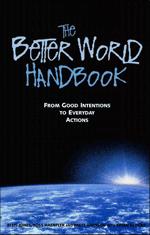
I haven't read this book but I like the seven foundations of a better world that they suggest: Economic Fairness, Comprehensive Peace, Ecological Sustainability, Deep Democracy, Social Justice, Culture of Simplicity, and Revitalized Community.
They also mention a section on the traps that stop people from making a difference. Honestly, I sometimes feel the trap myself - doing my own thing with no second thought of how my everyday actions: buying from the local grocer, donating money / goods to a non-profit, calling a friend, investing in the right bank - sends a message to those around you. We can choose to set the pace or momentum to make small changes and hope that others around you are inspired to think about their daily lives too. Snowball effect.
"You must be the change you wish to see in the world." M K Gandhi
There is also a list of top 10 actions. I'm not so sure of the "eat less meat" section myself but I think I attempt to follow most of the other suggestions made.
Wednesday, July 20, 2005
A Loving Spoonful

This Vancouver organization is successful because they campaign well for one simple message - assist those with HIV/AIDs with meeting the basic need for food. Providing these individuals with food means one less in the hospital for symptoms which are aggrevated by malnutrition. As well, the program provides assistance to those with the disease who are too sick to retrieve help on their own and gives them a chance to "focus on life's other challenges".
The goal for 2005 is to provide 100,000 meals free of charge. If you get the opportunity to be in Vancouver, attend one of their fundraisers or read their newsletters. This one simple model is well known throughout the city and gives at least 275 men, women and children assistance who would not otherwise have a chance.
Tuesday, July 19, 2005
Message from Abroad
I just received a message from a friend travelling through Ko Phi Phi island in Thailand, an island that was struck by the infamous tsunami in December. He believes that this island that typically has 10,000 people at peak season now sees only around 1500. As well, he talked about the Help International hospital Hi Phi Phi treating patients for free. All rebuilding has come straight from locals and volunteers of the organization. He states that Thai government has refused international aid money from donated relief funds.
I suppose this is a portion of the truth. We probably do not know whether the outpouring of support came with certain conditions for the funding. We probably do not know the large number of NGOs constantly arguing over control of relief aid distribution. We probably did not know that during this argument certain piles of emergency supply boxes sat guarded in the sun - no distribution. We probably didn't know that some children had at least 3-4 immunization shots when all they need is one.
It's a bit more of a sombre jaded note to relief and development. I still believe that the small things that we do count - sometimes in good ways and sometimes in bad. Are these aid projects able to sustain administratively through the local people and without funding in the long run? One project comes to mind: I was doing my research in the rural markets and I was asked by a local whether my organization was going to fill the water tank in the middle of the market. I looked up and there was this green structure that was to provide water for the area - empty and unused since the project was dropped 3 years ago. The women looked at me for help as they told me how they send their children off to collect water to run their food business, some water sources being 3-4 hours away. They are disenchanted as they have lost trust in this organization and probably future projects to come.
What will happen when the NGOs/volunteers in Thailand are tired of paradise, had their taste of "feel-good" and leave? Is there a game plan of project continuity or do they wipe their hands clean without a second thought of the adverse effects on the children after 3-4 measle / hep / "supposed-cure" injections? Hands are not wiped clean for the locals.
I suppose this is a portion of the truth. We probably do not know whether the outpouring of support came with certain conditions for the funding. We probably do not know the large number of NGOs constantly arguing over control of relief aid distribution. We probably did not know that during this argument certain piles of emergency supply boxes sat guarded in the sun - no distribution. We probably didn't know that some children had at least 3-4 immunization shots when all they need is one.
It's a bit more of a sombre jaded note to relief and development. I still believe that the small things that we do count - sometimes in good ways and sometimes in bad. Are these aid projects able to sustain administratively through the local people and without funding in the long run? One project comes to mind: I was doing my research in the rural markets and I was asked by a local whether my organization was going to fill the water tank in the middle of the market. I looked up and there was this green structure that was to provide water for the area - empty and unused since the project was dropped 3 years ago. The women looked at me for help as they told me how they send their children off to collect water to run their food business, some water sources being 3-4 hours away. They are disenchanted as they have lost trust in this organization and probably future projects to come.
What will happen when the NGOs/volunteers in Thailand are tired of paradise, had their taste of "feel-good" and leave? Is there a game plan of project continuity or do they wipe their hands clean without a second thought of the adverse effects on the children after 3-4 measle / hep / "supposed-cure" injections? Hands are not wiped clean for the locals.
Monday, July 18, 2005
Nucleo de Arte - Arms into Art

Mozambican artists take parts of the past and turn it into international awareness by means of art. During my stay in Mozambique, I had a chance to see old AK 47s lefted after the end of civil war in 1992 and watch it welded, bent, and molded to animals and figures - symbols of change, symbols of end of war.
Sunday, July 17, 2005
Your Two Cents

Paying taxes? You may or may not know it, you are making a difference abroad. Every dollar or euro you pay in tax, a few cents are going towards development or aid projects abroad. For Canadians, we contribute two cents for every dollar - that is close to $2.2 billion dollars annually. Governmental agencies such as the CIDA (Canadian International Development Agency), USAID, or DFID have mandates to distribute these funds to projects including the one that I was working for in Mozambique. My particular project was one of CIDA's International Youth Internship Programs where I worked as a Market Research Associate for the Mozambique Microfinance Facility. My job was to investigate the peri-urban areas of Maputo and to analyze the financial needs and risks of small businesses in their rural marketplace.

The results? Since I was supported by your tax dollars, I suppose I do have an obligation to report to you that my results state that there is an essential need for these businesses to have access to working capital. The men and women of Maputo search for opportunities to diversify their products, make new purchases of inventory, and make expansions for their business. Sounds like a business in our own home towns, doesn't it?
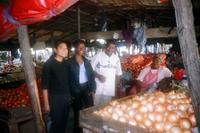
The huge difference is that a majority of these businesses are run under small budgets (just enough to cover basics and subsistent - as little as $20-$100 to run business) and they face harsh realities of poverty that place their business in a risky predicament (eg. the owner becomes sick or goods are stolen). A smaller group of businesses have past this stage and are able to mitigate risks through financial planning strategies yet struggle due to lack of capital access. They are ready to expand but need a start-up loan to get off them off the ground. Programs such as microfinance comes to play for these entrepreneurs and assist with loans & savings or provide client business training. I'll write more later about the good, the bad and the ugly of these microfinance institutions.
Why did CIDA fund a project like this? Why would Canadians be interested in investing in a microfinance project in Mozambique? A chance to display Canadian expertise in microfinance training and project management? A future possibility of international trade in this country? A chance for a young person to learn about business in Southern Africa who would otherwise never have the opportunity to do? If the last was the objective, goal accomplished and thank you for your two cents.
Wednesday, July 13, 2005
The Tipping Point

A while ago I was recommended this book on the way humans can act that can create change in a big way. I started some of it then had to give it back during the days of travel. The book is The Tipping Point: How Little Things Can Make a Big Difference by Malcolm Gladwell. He describes that people could possibly be categorized as a Connector, Maven or Salesman... I think I'm 40% connector 60% maven. pretty good real life examples. Yea, I'm 142 on the waiting list at the Vancouver Public Library.
Monday, July 11, 2005
Aiding Africa
David Kilgour, MP for Edmonton Beaumont, wrote an article in the Globe and Mail of some books to read if you were interested in better understanding of the history of Africa's past and realistic picture of the challenges faced. He said it best that "Africans have always had solutions to their own problems. It's time we start including them fully in the conversation" as a response to the writings of Kenya's first president Nkrumah and other Africans seeking change on their continent. Western policy: not necessarily the best way to go. The answers may already be sitting right under their noses.
Amazing Canadians
I came back from Kelowna yesterday thinking about what people are doing these days that are bringing about positive change. I came up with the names of two Canadians: Lilian To and Chuck Cadman. Extraordinary contributions in their own ways... Unfortunately, Canada experienced a huge loss as they both passed away this week.
Lilian To was the CEO of S.U.C.C.E.S.S, an organization that "assists new Canadians in overcoming language and cultural barriers, achieving self-reliance and contributing fully to Canadian society". My co-worker's kids grew up with Lilian's kids and mentioned her devotion to her work with those new to the country, doing 14 hour days, 7 days a week. She was front line to advocacy speaking out for equality for all Canadians.
Chuck Cadman, was an Independent Member of Parliament who is most famous for his recent vote to keep the minority Liberal government alive in Canada. I knew him as the father of a kid, Jesse, in my former high school who was murdered by a gang. From that point on, he fought for youth justice (including sentencing the youth responsible for Jesse's death in adult court - life sentence) and held integrity for his cause.
If you knew that your end was near, could you say that you have done your best to contributing all that you can to your family, city, or the world? How would you like to be remembered?
Lilian To was the CEO of S.U.C.C.E.S.S, an organization that "assists new Canadians in overcoming language and cultural barriers, achieving self-reliance and contributing fully to Canadian society". My co-worker's kids grew up with Lilian's kids and mentioned her devotion to her work with those new to the country, doing 14 hour days, 7 days a week. She was front line to advocacy speaking out for equality for all Canadians.
Chuck Cadman, was an Independent Member of Parliament who is most famous for his recent vote to keep the minority Liberal government alive in Canada. I knew him as the father of a kid, Jesse, in my former high school who was murdered by a gang. From that point on, he fought for youth justice (including sentencing the youth responsible for Jesse's death in adult court - life sentence) and held integrity for his cause.
If you knew that your end was near, could you say that you have done your best to contributing all that you can to your family, city, or the world? How would you like to be remembered?
Saturday, July 09, 2005
Adbusters - Ideas on Development
This organization use of irony and mockery works on me. Using the same letter campaign (see MakePovertyHistory.ca), they ask Sir Geldorf use this publicity opportunity to open discussion on development besides the use of humanitarian aid. Interesting concept that the EU has suggested in raising funds for their goals in International Aid: using a fuel tax on air flights.
Friday, July 08, 2005
G8
So my former Vancouver roommate would like to inform me that there is a plain clothed "secret" police officer on the top of her apartment building in Edinburgh during the whole G8 summit. From her perspective, the town has become a bit eery with all the police on the streets and protesters / revellers scattered throughout the city.
She and her boyfriend also had the chance to see Live 8 concert last Wednesday at Murrayfield. Special guest appearance by Bono. You lucky girl!
So I have finally got my act together and looking to apply for a program in International Economic Development. Here we come paperwork, bureaucracy and fun. I am currently working on an essay making comments about one of these Articles:
Changing Patterns of Global Competition by Mike Morris - still reading about it... send your comments if you read it before me!
or
Growth, development, poverty and inequality by Julian May - an article about these general topics and South Africa's struggle to create policy fighting poverty and inequality.
She and her boyfriend also had the chance to see Live 8 concert last Wednesday at Murrayfield. Special guest appearance by Bono. You lucky girl!
So I have finally got my act together and looking to apply for a program in International Economic Development. Here we come paperwork, bureaucracy and fun. I am currently working on an essay making comments about one of these Articles:
Changing Patterns of Global Competition by Mike Morris - still reading about it... send your comments if you read it before me!
or
Growth, development, poverty and inequality by Julian May - an article about these general topics and South Africa's struggle to create policy fighting poverty and inequality.
Thursday, July 07, 2005
Mozambique and USAID funding - articles
My roommate in Mozambique sent me this article talking about the restrictions and conditions put on USAID funded projects in Africa in regards to HIV/AIDS.
It's a pretty liberal sided view which let's us know how most USAID funding goes to the "Abstinence" and "Be Faithful" projects of their "ABC" theme to their projects and little emphasis goes towards "Condoms". It is a difficult position for those organizations who need funding but prefer to follow the cultural context that they work in; a cultural context that respects the local traditions / behaviours and a cultural context which social marketing will not be able to change overnight.
It's a pretty liberal sided view which let's us know how most USAID funding goes to the "Abstinence" and "Be Faithful" projects of their "ABC" theme to their projects and little emphasis goes towards "Condoms". It is a difficult position for those organizations who need funding but prefer to follow the cultural context that they work in; a cultural context that respects the local traditions / behaviours and a cultural context which social marketing will not be able to change overnight.
International Health Course
I just wrapped up a six-week online course offered at the University of British Columbia called Introduction to International Health and Development. See if you can log in before it shuts down:
http://www.cstudies.ubc.ca:8900 - ID - kdiga, pass - swan.
http://www.cstudies.ubc.ca:8900 - ID - kdiga, pass - swan.
Wednesday, July 06, 2005
G8 & Africa take the news.
Today's Globe & Mail newspaper had six articles/editorials concerning the G8 summit and what each writer believes this gathering will actually produce at the end of the day.
Front Page: Stephen Lewis, United Nations envoy on AIDS in Africa, tells it as it is when he calls the bluff of the US in providing $25 billion in annual aid to Africa in five years. The US places heavy conditions on recipients of aid (see next post) and thus Lewis believes the US will have a shortfall of the goal.
Page A12: Canada's commitment of $2.8 billion by 2008: how to disburse fund - to specific projects or to the government? Pros of giving to government: bilateral relief allows countries capacity to rebuild their schools and clinics from a national level. Cons: misuse of funds when no conditions are set. Monitoring funds becomes difficult.
Third article on World Bank president, Paul Wolfowitz, asking for "an integrated approach" to poverty alleviation: aid is only one piece to other components that will assist African nations at fighting corruption, opening private sector investments, lowering barriers to trade, etc.
Editorial page has Kofi Annan, Secretary-General of the UN asking the G8 leaders to look at peace and security, a global strategy to secure a respect for human dignity.
Another article of how Paul Martin wants to expand the G8 to the L20, leaders' summit of 20 countries. Effective or not?
Finally, an article again about corruption of foreign aid to African countries. Honesty and good management - good governance through NEPAD, the New Partnership for African's Development - should be demanded before taxpayer cash is given. So is a set of good system and controls. Thanks Live 8 for finally putting some international news/debate in our national paper.
Front Page: Stephen Lewis, United Nations envoy on AIDS in Africa, tells it as it is when he calls the bluff of the US in providing $25 billion in annual aid to Africa in five years. The US places heavy conditions on recipients of aid (see next post) and thus Lewis believes the US will have a shortfall of the goal.
Page A12: Canada's commitment of $2.8 billion by 2008: how to disburse fund - to specific projects or to the government? Pros of giving to government: bilateral relief allows countries capacity to rebuild their schools and clinics from a national level. Cons: misuse of funds when no conditions are set. Monitoring funds becomes difficult.
Third article on World Bank president, Paul Wolfowitz, asking for "an integrated approach" to poverty alleviation: aid is only one piece to other components that will assist African nations at fighting corruption, opening private sector investments, lowering barriers to trade, etc.
Editorial page has Kofi Annan, Secretary-General of the UN asking the G8 leaders to look at peace and security, a global strategy to secure a respect for human dignity.
Another article of how Paul Martin wants to expand the G8 to the L20, leaders' summit of 20 countries. Effective or not?
Finally, an article again about corruption of foreign aid to African countries. Honesty and good management - good governance through NEPAD, the New Partnership for African's Development - should be demanded before taxpayer cash is given. So is a set of good system and controls. Thanks Live 8 for finally putting some international news/debate in our national paper.
Subscribe to:
Comments (Atom)
